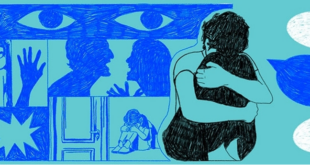Our social support networks affect us in a variety of ways, and a large body of research has examined the physical and mental health correlates of the positive (social support) and the negative (negative social exchange) aspects of social support networks. Our study builds on that research by examining the relationship between social support and negative social exchange reported by patients pre-treatment and the pattern of subsequent change in symptoms those patients experience over the course of cognitive behavior therapy. We found that the quality of a patient’s experiences in their social network might impact their response to treatment. We were particularly interested in examining how social support and negative social exchange might be related to treatment response in the context of case-formulation based cognitive behavior therapy. This is an approach to cognitive behavior therapy in which the therapist integrates various types of data into a coherent model consisting of hypotheses about the mechanisms driving the patient’s presenting problems and then uses that model to select empirically supported interventions that have been shown to be effective in targeting the mechanisms identified by the therapist.
Our study participants were 74 adults with a range of diagnoses who worked with therapists using a case-formulation based cognitive behavior therapy approach in a private practice setting. We asked patients to complete measures prior to their first therapy session to assess positive (social support) and negative (negative social exchange) aspects of their social support networks, and the treating therapists then tracked the patients’ depression, anxiety, and stress symptoms weekly through treatment. We found that a higher level of pre-treatment social support was associated with lower levels of depression prior to treatment, and that a higher level of pre-treatment negative social exchange was associated with higher levels of depression and stress prior to treatment. We also found that pre-treatment social support was not significantly associated with how much patients benefitted from treatment, but that a higher level of pre-treatment negative social exchange was associated with treatment response. Patients who reported having more negative social exchanges pre-treatment experienced a steeper slope of change in symptoms of depression and stress during treatment. In other words, those patients who had a higher level of negative social exchange pre-treatment tended to have a higher level of depression and stress when they began therapy and also experienced a steeper drop in symptoms of depression and stress over the course of therapy (after controlling for their higher pre-treatment depression and stress scores). These findings suggest that the association between pre-treatment negative social exchange levels and subsequent symptoms may be stronger than that of social support and subsequent symptoms. Based on our results, we also suggest that patients may benefit from therapists attending to and assessing the positive and, especially, the negative qualities of their social support networks at the start of treatment and integrating that information into their treatment plan.
Read the full paper: Eidelman, P., Jensen, A., & Rappaport, L. M. (in press). Social support, negative social exchange, and response to case formulation-based cognitive behavior therapy. Cognitive Behaviour Therapy. doi:10.1080/16506073.2018.1490809



Photo by: Tom Hilton
 Cognitive Behaviour Therapy A peer reviewed, multidisciplinary journal devoted to the application of behavioural and cognitive sciences to clinical psychology and psychotherapy.
Cognitive Behaviour Therapy A peer reviewed, multidisciplinary journal devoted to the application of behavioural and cognitive sciences to clinical psychology and psychotherapy.




